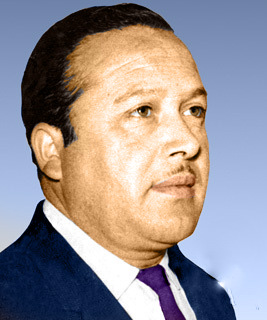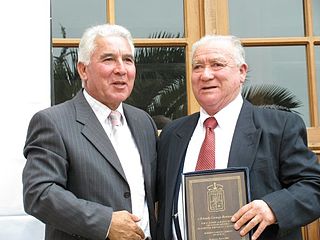
The Government of Pichilemu comprises the Mayor of Pichilemu and Pichilemu City Council. They are housed within Pichilemu town hall.

The Government of Pichilemu comprises the Mayor of Pichilemu and Pichilemu City Council. They are housed within Pichilemu town hall.
The Mayor of Pichilemu is elected every 4 years. The current mayor is Roberto Córdova.
The Pichilemu City Council is a seven-member city council.

Agustín Ross Cultural Centre, previously known as Casino Ross, is the cultural center of the city of Pichilemu in Libertador General Bernardo O'Higgins Region, Chile. It was constructed between 1906 and 1909 at the request of politician Agustín Ross Edwards. The structure of the cultural center is very similar to that of the Grand Trianon in Versailles, France.

The history of Pichilemu began around the 16th century, when Promaucaes inhabited the modern Pichilemu region. According to Chilean historiographer José Toribio Medina on his book Los Restos Indígenas de Pichilemu (1908), Spanish conqueror Pedro de Valdivia gave Topocalma encomienda, in which Pichilemu was supposed to be, to Juan Gómez de Almagro, on January 24, 1544.

The Mayor of Pichilemu is an elected politician who is the head of the executive branch of government of the commune of Pichilemu, Libertador General Bernardo O'Higgins Region, Chile. The mayor presides over the local city council, composed of six members, and serves as the civic representative of the commune. The mayor is popularly elected in a municipal election, by simple majority. The office is held for a four-year term without term limits.

The Pichilemu City Council is the legislative body of the City of Pichilemu. The council meets in Pichilemu City Hall.

The coat of arms of Pichilemu is the official heraldic symbol representing the city of Pichilemu, the capital of the Chilean province of Cardenal Caro. It consists of a party per cross referencing the importance of tourism in Pichilemu, and the commune's agricultural, huaso origins. The coat of arms is crested with a "symbolical representation of Pichilemu's past and present: a balustrade fused in a mitre", worn by José María Caro Rodríguez, the first Cardinal of the Chilean Roman Catholic Church, who was born in the village of San Antonio de Petrel, in Pichilemu.

José María Caro Martínez was a Chilean politician and civil servant. In May 1894, he was unanimously elected as the first mayor of the commune of Pichilemu, with Pedro Nolasco de Mira and Francisco Reyes made second and third magistrate respectively. Caro Martínez had previously served for several years as administrator or llavero of the San Antonio de Petrel hacienda and, between 1891 and 1892, was the Subdelegate of the 13th Subdelegation of San Fernando Department which comprised the district of Cáhuil.

René Gabriel Maturana Maldonado was a Chilean journalist and the 36th Mayor of Pichilemu, holding the position from his appointment by President Augusto Pinochet Ugarte on 31 August 1984 until his resignation in April 1992.

Francisco Javier Asalgado was a Chilean politician. He was the second and fourth mayor of the commune of Pichilemu, an office which he held between May 1905 and September 1909, and between May and September 1912.
José Santos Becerra was the fifth Mayor of the commune of Pichilemu, office which he held between September 1912 and May 1915.
Francisco Adriano Caro Rodríguez was the eighth mayor of the commune of Pichilemu, Chile, an office which he held between December 1925 and May 1927.
José Manuel Camilo Silva was the tenth Mayor of the commune of Pichilemu, office which he held between May and July 1928.
José Ramón Araneda y Araneda was a Chilean politician and the 11th Mayor of the commune of Pichilemu, an office which he held between July 1928 and July 1930.
Pastor Castro Rojas was the 12th Mayor of the commune of Pichilemu, office which he held between July and November 1930. He left the office because of poor health.
José Serafín López Lizana was the 17th mayor of the commune of Pichilemu, an office which he held from May 1935 until his death in October of that year. He was succeeded by Humberto Llanos Martínez.

Humberto Llanos Martínez was the 18th Mayor of the commune of Pichilemu, office which he held for two three-year terms, between December 1935 and May 1941. He took office following the death of the previous mayor, Serafín López Lizana, and was succeeded by Felipe Iturriaga Esquivel.
Carlos Ignacio Rojas Pavez was the 28th Mayor of the commune of Pichilemu, office which he held between May 1967 and May 1971. For almost three decades, Rojas Pavez worked as the municipal secretary of Pichilemu, and in 1944, along with José Arraño Acevedo and Miguel Larravide Blanco, founded Pichilemu, a newspaper focused in local stories.

Washington Saldías Fuentealba was the 29th Mayor of the Chilean commune of Pichilemu, office which he held between May 1971 and September 1973: his term was interrupted by the 1973 Chilean coup d'état, which put General Augusto Pinochet in the power of the country, and who later appointed Carlos Echazarreta Iñiguez as the successor of Saldías. Saldías was also regidor of the commune of Pichilemu between 1963 and 1971, and a founding member of the Club Aéreo de Pichilemu.
Gustavo Osvaldo Parraguez Galarce is the municipal secretary of Pichilemu, and was the interim Mayor of the commune of Pichilemu three different times, in 1992, 2007, and 2008.

Orlando Cornejo Bustamante was the 37th Mayor of the commune of Pichilemu, office which he held between September 1992 and December 1996, representing the Union of the Centrist Center (UCC). He was the first mayor of Pichilemu to be elected following the Chilean transition to democracy. In 1996 and 2000, he ran again as a candidate in the municipal elections of these years, but failed to be elected in either.

Pichilemu, originally known as Pichilemo, is a beach resort city and commune in central Chile, and capital of Cardenal Caro Province in the O'Higgins Region. The commune comprises an urban centre and twenty-two villages, including Ciruelos, Cáhuil, and Cardonal de Panilonco. It is located southwest of Santiago. Pichilemu had over 13,000 residents as of 2012.